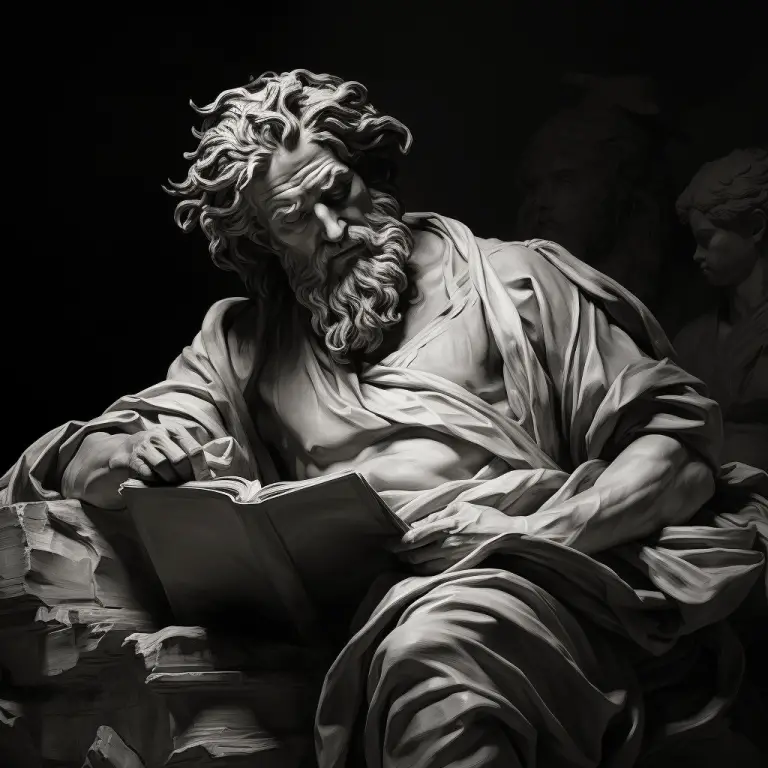What is Book 4 of the republic by Plato about? Book 4 of “The Republic” by Plato delves into the concept of justice and the ideal state. In this book, Socrates argues that a just man is one whose soul rules with reason, meaning that the rational part of the soul should dominate over the other parts. He believes that all virtues are rooted in wisdom and that only those who possess true wisdom can be considered virtuous.
The Philosophical Context
Book 4 of The Republic by Plato delves into the concept of justice and explores the nature of a just individual and a just city. In this section, Socrates provides a detailed analysis of the tripartite soul and its correlation to the construction of an ideal state.
Socrates argues that the soul is composed of three distinct parts: the rational part, the spirited part, and the irrational part. He posits that each part has its own unique function within an individual’s psyche. The rational part is naturally superior and should govern over the other parts to achieve harmony.
To illustrate his point, Socrates creates an analogy between the individual soul and a just city. He assumes that in a just city, there are three classes: rulers who possess wisdom, guardians who exhibit courage, and producers who contribute through their skills. Each class corresponds to one of the parts of the soul.
Socrates claims that for both individuals and cities to be just, all three classes must fulfill their specific roles harmoniously. The ruling class must possess wisdom and make decisions based on reason, while the spirited class must display courage in defending justice. Lastly, the producing class contributes through their skills but does not have political power.
Socrates turns his attention towards education as he believes it plays a crucial role in shaping individuals and society as a whole. He emphasizes physical education for cultivating discipline in young individuals while also stressing intellectual development through philosophical teachings.
Throughout Book 4, Socrates points out potential issues with other forms of governance prevalent in other cities such as extreme wealth or laws that focus solely on material gain rather than promoting justice. He highlights how these factors can lead to social instability.
In response to critics questioning whether such an ideal state is possible or merely theoretical, Socrates presents specific laws aimed at ensuring justice within this utopian society. These laws are designed to promote harmony among citizens while guaranteeing they fulfill their legal obligations.
Socrates proceeds to discuss the role of pleasure in a just state, distinguishing between certain pleasures that align with wisdom and those that arise from irrational desires. He argues that true guardians should prioritize the pursuit of knowledge and all the virtues over indulging in base pleasure.
Ultimately, Socrates concludes that a truly just city can only be achieved when each individual within it understands their own role and contributes to society harmoniously. By balancing the distinct parts of the soul, both individuals and the whole city can thrive, creating an ideal state ruled by wisdom and justice.
In summary, Book 4 of “The Republic” explores the concept of justice through an analysis of the tripartite soul and its correlation to constructing an ideal state. Socrates emphasizes education, distinguishes between different forms of pleasure, and presents laws aimed at ensuring harmony among citizens. Through this examination, he aims to find wisdom in order to create a just society where individuals correspond with their respective roles for the greater good.
Summary of Book 4
As Socrates proceeds with his argument, he responds to objections raised about whether such an ideal state is even possible or desirable. He asserts that although this perfect city may never exist in reality, its purpose is not practicality but rather understanding justice at its purest form.
Throughout Book 4, Plato explores various aspects related to justice – from understanding the distinct parts of the soul to creating an ideal state where individuals can flourish according to their nature. By examining these concepts, Plato aims to find wisdom in order to create a just society where individuals live fulfilling lives and the whole city thrives.
The Allegory of the Cave
Socrates explains that one prisoner is freed from his chains and exposed to sunlight outside the cave. This newfound enlightenment allows him to perceive true reality beyond mere appearances. The liberated prisoner represents philosophers who possess wisdom and understanding.
As this enlightened individual returns to share his newfound knowledge with others still trapped in darkness, he faces resistance and disbelief from those who have grown accustomed to their limited perception.
Socrates turns his attention to education within this allegory, emphasizing its crucial role in shaping individuals’ understanding of truth and justice. He argues that education should focus not only on intellectual development but also on physical education and moral guidance.
Furthermore, Socrates creates an ideal state where future rulers receive extensive education aimed at cultivating their rational faculties while instilling moral values through exposure to specific laws and experiences.
Throughout this dialogue, Socrates emphasizes that true guardians – those entrusted with ruling – must possess both wisdom (rational part) and courage (spirited part). By acknowledging their distinct roles within society while recognizing their interdependence, a harmonious and just city can be achieved.
In conclusion, Book 4 of “The Republic” by Plato explores the tripartite soul, the role of education in shaping individuals and society, and the concept of justice. The Allegory of the Cave serves as a powerful illustration of the journey from ignorance to enlightenment and highlights the importance of wisdom, courage, and proper education in creating an ideal state.

